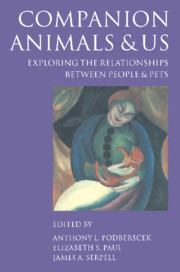Book contents
10 - Love of pets and love of people
from Part II - The nature of the relationship
Summary
INTRODUCTION
A good proportion of the relatively small amount of anthrozoological research conducted during the 1970s and early 1980s focused on the emotive question of whether or not love of pets is associated with love of people. Some researchers asserted that people who have great affection for animals also have greater warmth of feelings than most for their fellow human beings (Brown, Shaw & Kirkland, 1972; Paden-Levy, 1985). Others argued that the opposite was true; that people turn to pets for affection when their relationships with other people are inadequate or unfulfilled (Cameron et al., 1966; Cameron & Mattson, 1972; Peele & Brodsky, 1974).
As a whole, this discussion probably better resembled an expression of society's divided and ambivalent feelings towards animals than a serious psychological debate (Serpell, 1996). Moreover, such divided opinions were not new to the late twentieth century. Both supporters and detractors of the habit of pet-keeping had for many centuries been disputing the significance of pets for human social relations. Many prominent humanitarians of the eighteenth, nineteenth and early twentieth centuries were also acknowledged animal lovers, and Albert Schweitzer and Mahatma Gandhi explicitly linked individuals’ and societies’ moral greatness to their regard for the treatment of animals (see Maehle, 1994; Serpell, 1996, for historical reviews of this topic). But pet- keeping has also been viewed with deep suspicion by many, with affection for animals frequently being cited as evidence for witchcraft during the witch hunts of the sixteenth and seventeenth centuries (Serpell & Paul, 1994). Even George Orwell, writing in 1947 (Orwell, 1947, quoted in Serpell, 1996), blamed the rise of pet-keeping on the ‘dwindled birthrate’.
As anthrozoological research blossomed during the late 1980s and 1990s, empirical attention given to this issue decreased in prominence, although a parallel line of inquiry, concerning whether cruelty to animals is associated with human-directed violence, has been gaining attention in recent years. My aim in the present chapter is to revive the ‘love of people–love of pets’ debate, with a view to assessing whether contemporary research has been able to offer any convincing conclusions to this age-old argument. The motive for doing this is not to lend support to either a pro-pet or anti-pet viewpoint.
- Type
- Chapter
- Information
- Companion Animals and UsExploring the relationships between people and pets, pp. 168 - 186Publisher: Cambridge University PressPrint publication year: 2000



